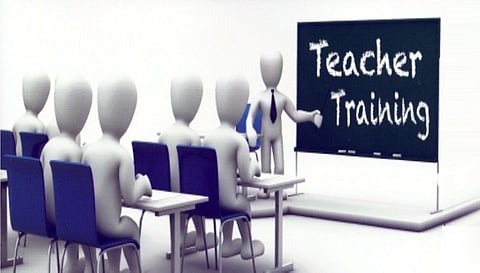
- Home
- Live Blog
- Breaking News
- Top Headlines
- Cities
- NE News
- Sentinel Media
- Sports
- Education
- Jobs

Questions over quality of teachers in India and the way they impart classroom education have always been under scanner. Time and again instances have come up which suggested that the system of imparting education to the future generation needs a complete rethink. Evaluation of teachers' competence and skills in delivering the classroom training have been very often swept under the carpet. In our country the student-classroom ratio and the pupil-teacher ratio still stand abysmally low at 23:1 at the primary school level. That means there is one teacher against twenty three students. In such a scenario the need for trained teachers becomes much more important and essential. Bachelor of Education (B. Ed ) course was specifically designed to plug that gap to produce trained teachers. But with the ever-increasing pressure on the education system for elementary learning, B. Ed colleges which could train teachers were few and far between. So there arises a demand-supply gap which is bridged with untrained teachers, and in many cases, corruption reigns supreme in the recruitment of teachers in various states of the country. After coming to power, the NDA government passed Bill that offered untrained teachers teaching in schools time till March 31, 2019 to acquire B, EI. Ed (Bachelor of Elementary Education) or D. El. Ed ( Diploma in Elementary Education) qualifications to hold their jobs as teachers. This move impacted nearly 5-6 lakh private school teachers and 2.5 lakh government school ones. By any stretch of imagination the numbers are alarmingly high. If one takes into account the outcome of all these untrained teachers teaching for 5-6 years, classroom activities are bound to receive a severe jolt, which, in all probability, is lethal enough to jeopardize the careers of millions of students. The NDA government launched the ambitious online training programme with much more fanfare as it did with its other flagship schemes. But as the ball started to set rolling the fault lines have started to appear putting a question mark on the entire management of the whole teachers training programme. Following Prime Minister Narendra Modi’s push for digital India, the entire process of admission, verification for B. El. Ed and D. EL. Ed were made online. National Institute of Open Schooling ( NIOS) was the nodal agency which is overseeing the project. But the question is -- is it a foolproof system to produce trained teachers? Many teachers who are undergoing the training regularly complain of lack of coordination of the authorities in conducting the training of the untrained teachers. There are few centres for regular classes and to top it all the examination fees are in very high range. For many private school teachers, who are criminally low paid, the examination fees is an extra financial burden. Ditto is the case with many government primary teachers in the State where salary is irregular. Many private schools have come forward to say the rule doesn’t make sense, as most of their teachers have much more advanced qualifications, but are still rendered technically ‘untrained’ without this diploma. Many educationists feel this is a mockery of the education system. We have teachers with engineering, M Ed and Ph D degrees in our schools. Unaided schools have to focus on the quality of education. Topics covered under the D El Ed programme include child development and learning, curriculum and paedagogy, regional language, English language teaching, environmental science teaching, mathematics teaching, art education, physical education, social science teaching and general science education. The minimum qualification for admission to D El Ed for untrained in-service teachers is 50 per cent aggregate marks in Class XII. Even if a teacher is a graduate, the marks in Class XII remain applicable. While making teachers study a lower educational qualification is unfair, it is also a fact that a teacher with a higher qualification is not always good at his/her job. It is not true that a B Ed holding teacher is always better than one with a D El Ed. As far as theory under both courses is concerned, it is more or less the same — the only difference is the practical aspect. To clear this, there should be an update in the syllabi of both courses. However, it appears that the decision like many other has been taken in a hurry. It would have been prudent on the part of the HRD Ministry to devise a much more practical-oriented course rather than pushing teachers to pass the examinations to cling on his or her post. At the end it turns out to be a symbolic effort with less substance.